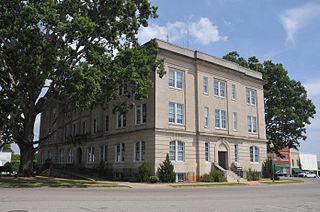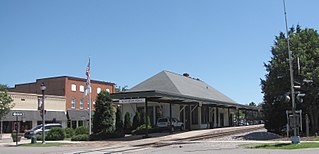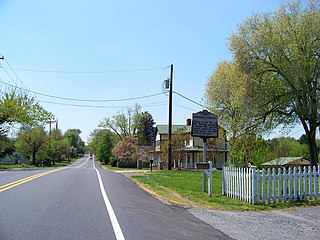
Moore County is a county located in the U.S. state of North Carolina. As of the 2020 census, its population was 99,727. Its county seat is Carthage and its largest community Pinehurst. It is a border county between the Piedmont and the Atlantic Coastal Plain.

Pinehurst, known formally as The Village of Pinehurst, is a village in Moore County, North Carolina, United States. As of the 2020 census, the village population was 17,581. Pinehurst refers to both the village, and the Pinehurst Resort, a Golf resort, which has hosted multiple United States Open Championships in the sport. A large portion of the central village, including the resort complexes, is a National Historic Landmark District, designated in 1996 for its landscape design by Frederick Law Olmsted and its significance in the history of golf in the United States. Pinehurst has been designated as the "Home of American Golf" by the United States Golf Association and by the State of North Carolina. The surrounding area is known for its strong equestrian community, including the former Stoneybrook Steeplechase, and the current Pinehurst Harness Track. Fox hunting is also a common sport in the area.

Southern Pines is a town in Moore County, North Carolina, United States. The population was 12,334 as of the 2010 United States Census.

Asa Biggs was an American attorney, politician, and jurist who served as a member of both chambers of the United States Congress and as a United States district judge of the United States District Court for the Albemarle, Cape Fear and Pamptico Districts of North Carolina.

Hanging Rock State Park is a 9,011-acre (3,647 ha) North Carolina state park in Stokes County, North Carolina in the United States. The park is 30 miles (48 km) north of Winston-Salem and is located approximately 2 miles (3.2 km) from Danbury in Stokes County.

Germanton is an unincorporated community and census-designated place (CDP) in Forsyth and Stokes counties in the U.S. state of North Carolina, primarily in Stokes County. As of the 2020 census, the community had a population of 790.

Pinnacle is an unincorporated community and census-designated place in southwestern Stokes County, North Carolina, United States, approximately 5 miles (8.0 km) SSE of the town of Pilot Mountain, between Pilot Mountain State Park and Hanging Rock State Park.

Moores Springs is an unincorporated community in Stokes County, North Carolina, United States, approximately five miles west-northwest of Danbury, near Hanging Rock State Park. It is becoming well known for its mountain biking trails and access to the Dan River.

The North Carolina Executive Mansion is the official residence of the governor of North Carolina and their family. Building began in the year 1883 and it was designed by architects Samuel Sloan and A.G. Bauer. The first occupants, Governor Daniel G. Fowle and his daughter, Helen Whitaker Fowle, moved into the unfinished building in January 1891. It is an example of Queen Anne style architecture.

Currie is an unincorporated community in Pender County, North Carolina, United States. The community is located south of Yamacraw. It is best known as the birthplace of the fictional character Philip Banks from The Fresh Prince of Bel-Air.

The Carson House is a historic house and museum located in Marion, North Carolina. It was the home of Col. John Hazzard Carson, and served as the McDowell County courthouse when the county was first organized in 1842.

This list includes properties and districts listed on the National Register of Historic Places in Wilkes County, North Carolina. Click the "Map of all coordinates" link to the right to view an online map of all properties and districts with latitude and longitude coordinates in the table below.

This list includes properties and districts listed on the National Register of Historic Places in Stokes County, North Carolina. Click the "Map of all coordinates" link to the right to view a Google map of all properties and districts with latitude and longitude coordinates in the table below.

Richard Sharp Smith was an English-born American architect, noted for his association with George W. Vanderbilt's Biltmore Estate and Asheville, North Carolina. Smith worked for some of America's important architectural firms of the late 19th century—Richard Morris Hunt, Bradford Lee Gilbert, and Reid & Reid—before establishing his practice in Asheville. His most significant body of work is in Asheville and Western North Carolina, including dozens of buildings that are listed on the National Register of Historic Places or are contributing structures to National Register Historic Districts.

The House in the Horseshoe, also known as the Alston House, is a historic house in Glendon, North Carolina in Moore County, and a historic site managed by the North Carolina Department of Natural and Cultural Resources' Historic Sites division. The home, built in 1772 by Philip Alston, was the site of a battle between loyalists under the command of David Fanning and patriot militiamen under Alston's command on either July 29 or August 5, 1781. The battle ended with Alston's surrender to Fanning, in which Alston's wife negotiated the terms with the loyalists.
Moore House, also known as Stamp's Quarter, is a historic home located near Locust Hill, Caswell County, North Carolina. It was built about 1790, and is a two-story, three-bay, Federal-style brick dwelling. It is set on a full, raised basement, has exterior end chimneys, and a low hipped roof.
Eli Moore House is a historic home located near High Point, Davidson County, North Carolina. It dates to the late-18th or early-19th century, and is a 1+1⁄2-story, hall-and-parlor plan, log dwelling with a rear wing. The house measures 26 feet by 18 feet and sits on a fieldstone pier foundation.

Zevely House is a historic home in Winston-Salem, Forsyth County, North Carolina.

Walter E. Moore House is a historic home located at Webster, Jackson County, North Carolina. The house was built in 1886, and is a 1+1⁄2-story, three bay by one bay, "T"-plan, Vernacular Victorian-style frame dwelling, with a one-story original rear ell. It has a hipped roof porch with turned posts, balusters, and sawnwork brackets. Also on the property are the contributing well house and shed.

Rock House, also known as the John Martin House, is a historic home located near King, Stokes County, North Carolina. It was built about 1785, and is a two-story, fieldstone ruin. It has been a ruin since the late-19th century. It is believed to have been built by Colonel John Martin, an early landowner in Stokes County. The property is maintained by the Stokes County Historical Society.






















